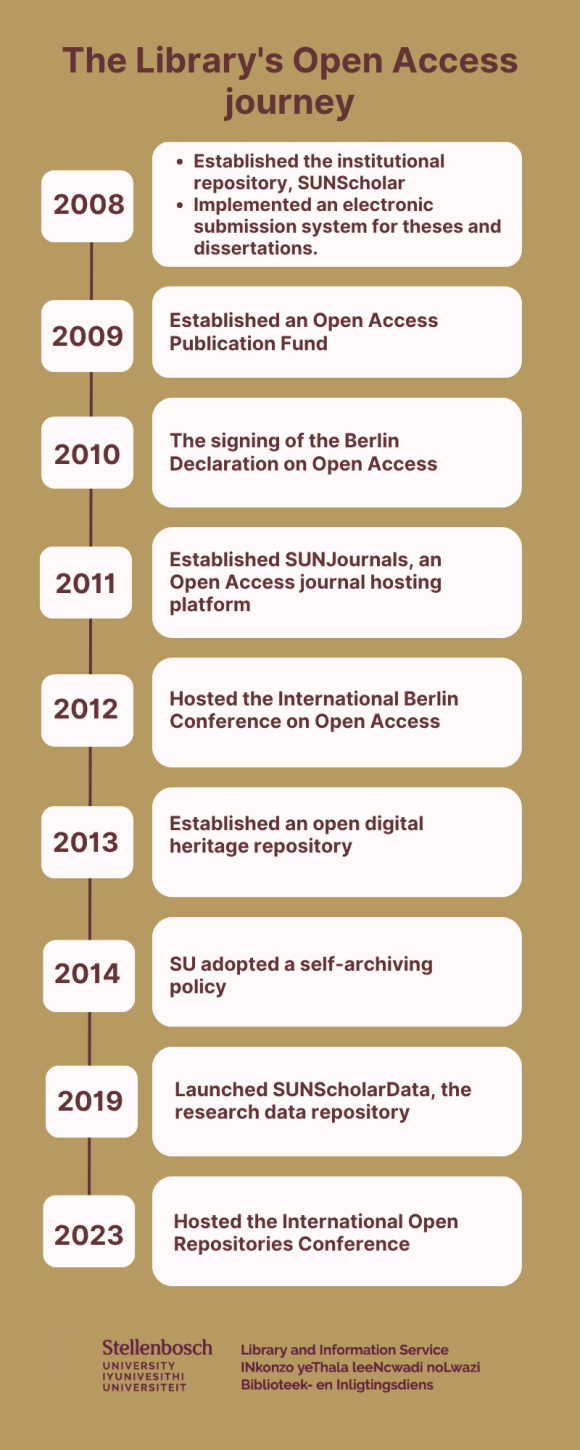As a transformative approach to scholarly communication, Open Access (OA) seeks to remove barriers to accessing, sharing and reusing research outputs.
Scholars such as Raffaela Kunz and Monika Plozza believe that this approach not only contributes to the sharing of research but could potentially advance universal access to information, as envisioned by the United Nations Human Rights framework and the Sustainable Development Goals (SDGs).
It can also play a transformative social justice role by closing the digital gaps and dismantling information disparities between those who have the resources and means to purchase and access information and those who do not, according to Paul Ginsparg, founder of the open-access archive arXiv. University of Cape Town academics Laura Czerniewicz and Sarah Goodier highlight the need for OA as both an economic and democratic one.
Worldwide, universities and academic libraries are involved in OA advocacy, encouraging researchers to publish their work in OA platforms.
These institutions believe that OA enhances the reach and impact of scholarship.
The commitment of Stellenbosch University (SU) to OA was cemented 15 years ago with the signing of the Berlin Declaration on Open Access by the former rector and vice-chancellor, Professor Russel Botman, on 20 October 2010. In doing so, Botman became the first VC of an African university to sign the declaration, positioning SU as a pioneer on the continent in taking the OA pledge.
This landmark commitment marked the acceleration of OA, giving the university library strategic impetus and legitimacy in its advancement, support and advocacy of OA and other open-science initiatives.
The signing of the declaration itself was symbolic as it was signed during International Open Access Week. In an opinion piece for the Mail and Guardian on 29 October 2010, aptly titled ‘Stellenbosch takes open access lead’, the Senior Director of the SU Library and Information Services, referred to the signing of the OA pledge as “an important step towards sustainable human development” and towards the realisation of equitable information access.
Fifteen years later, we reflect on the progress, challenges, and future under the theme of the International Access Week 2025: “Who Owns Our Knowledge?”‘
Open Access has been embraced by the Library and the University and has become a vehicle for increasing the impact of research at this institution and allowed the library to go on this journey.
The Library’s OA journey began in 2008 with the establishment of the institutional repository, SUNScholar, and the implementation of an electronic submission system for theses and dissertations. SUNScholar boasts over 35 000 full text research outputs with more being added annually.
The Library’s commitment to Open Access was furthermore manifested in the establishment of an Open Access Publication Fund in 2009, which funded 1035 SU research publications until its closure in 2021.
The hosting of an Open Access Seminar in 2010 was also a highlight where Stellenbosch University became the first African University to sign the Berlin Declaration of Open Access to Knowledge in the Sciences and Humanities.
In 2011 the Library established SUNJournals, an open access journal hosting platform for journals with an SU affiliation. We currently host 23 journals in various disciplines.
In 2012 we hosted the International Berlin Conference on Open Access. This was the first time that the Berlin Open Access Conference was held in Africa. It explored the transformative impact that open, online access to research has on scholarship, scientific discovery, and the translation of results to the benefit of the public.
In 2013 the library established an open digital heritage repository to showcase and allow access to the library’s special and unique collections and currently provides access to over 18 000 unique records in 50 collections. We can see examples of these materials being accessed and used in a range of outputs.
In 2014 the University adopted a self-archiving policy that asks SU authors to submit a copy of their accepted manuscript to the institutional repository.
In 2019, with research data widely recognised as crucial to the research process and the preservation of and access to such data becoming an absolute necessity, the library launched SUNScholarData.
This research data repository enables Stellenbosch University researchers to share and disseminate their research data in accordance with good research data management practices and will serve to facilitate the findability, accessibility and reusability of the university’s research data.
In 2023 the Library hosted the International Open Repositories Conference, the first time this event was held on African soil.
Our Open Access journey continues with ongoing negotiations regarding transformational agreements and our commitment to Open Access will remain steadfast and help us to take on whatever new OA developments may come our way.
Authors: Ellen Tise, Mimi Seyffert-Wirth, Siviwe Bangani
This article is based on notes prepared for Miss Ellen Tise’s speech during the International Open Access Week celebrations and the 15-year commemoration of the signing of the Berlin Declaration on Open Access at Stellenbosch University on 22 October 2025. Some of the text was extracted from an article Open access and research outputs: Who owns our knowledge? which was published in University World News, Africa Edition.
